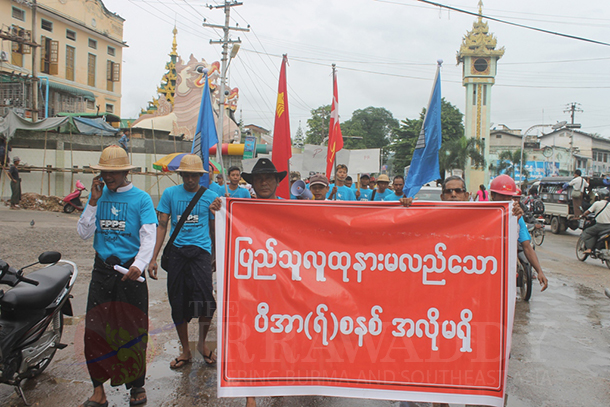Move to Proportional Representation a Power Grab by the Military-backed USDP
By Burma Partnership • August 5, 2014 The debate over a potential change to Burma’s electoral system, from a First Past the Post System (FPP) to a Proportional Representation System (PR) is gathering momentum, with a new committee formed by the Parliamentary lower house speaker, Shwe Mann, to discuss whether this is appropriate for the country. While the general debate over suitability of differing electoral systems is complex and broad, if seen through the eyes of the context in Burma, there is one clear winner if this change is implemented before the 2015 general election: the military-backed Union Solidarity and Development Party (USDP) which is unsurprisingly supportive of this change.
The debate over a potential change to Burma’s electoral system, from a First Past the Post System (FPP) to a Proportional Representation System (PR) is gathering momentum, with a new committee formed by the Parliamentary lower house speaker, Shwe Mann, to discuss whether this is appropriate for the country. While the general debate over suitability of differing electoral systems is complex and broad, if seen through the eyes of the context in Burma, there is one clear winner if this change is implemented before the 2015 general election: the military-backed Union Solidarity and Development Party (USDP) which is unsurprisingly supportive of this change.
The argument for Burma to change to PR is certainly compelling. Theoretically, it will give smaller political parties, such as the NDF who proposed the motion, more chance of representation in the legislature, while the same goes for smaller ethnic political parties. Yet it is much more complex than this. For constituencies in ethnically concentrated areas, where there is a dominant ethnic political party, for example the Rakhine Nationalities Development Party (RNDP) in Arakan State, FPP is more advantageous for that dominant ethnic political party, as seen in the RNDP’s dominance of the Arakan State legislature. Focusing on winning seats in ethnically concentrated areas might be the only way that ethnic political parties guarantee representation under the first past the post system. Yet under PR, if the total population of a certain ethnic group is under the 1% threshold of votes needed to gain a seat that is typical of PR, then that party will not win any seats at all, even if the ethnic nationality it represents is dominant in certain constituencies.
Yet if we move away from the complexities of the argument for PR over FPP, if the electoral system is indeed changed, the one clear winner will be the USDP. This is because under the current system, the dominance of the National League for Democracy (NLD) means that it is highly likely that they will enjoy a sweeping victory in next year’s election, certainly in central and lower Burman-dominated areas, but also in constituencies where non-Burman ethnic composition is mixed. This was seen in the 2012 by-election, where the NLD won all but one seat. If the 2012 by-election would have been based on PR however, the USDP would have gained much more than their single seat victory, as they received nearly a third of the total votes, and as such, would have won nearly a third of the seats.
The next question that needs to be asked then is whether PR is fairer as it more accurately represents the number of votes that parties receive? For many people that question could quite easily be answered yes, but Burma is different. The USDP is the military backed party, with many members formerly of the armed forces. The 2008 Constitution already guarantees that the military has 25% of the seats in both houses of Parliament. A PR system might give smaller parties a few more seats in Parliament, but the most significant change will mean significantly more USDP seats at the expense of the NLD, and thus a greater combined block that is either military or military backed. It is thus of no wonder that current USDP MPs support the change to PR.
Burma has not even had one free and fair general election since 1990, except the 2012 by-elections. The results of the 2010 general election are widely seen as fraudulent, while the 2012 by-elections that were much freer were dominated by the NLD. This is frightening for the ruling party and the military and, as such, they are very much in favour of a change from an electoral system under which they know they will suffer a heavy loss, despite the 25% guarantee of seats in parliament.
Burma’s transition to democracy is still in its earliest of phases, and as such, substantial changes in the political system orchestrated by the ruling party are simply not suited. As Ko Ko Gyi from the 88 Generation Peace and Open Society stated; “We are still at a stage where the status of representation in parliament is questionable. For an important change like this, we must debate long and hard. We should not rush into this.” Burma certainly should not rush into a political move that consolidates the power of the military and its proxy political party. More reforms need to take place, particularly amending the 2008 Constitution, to ensure that a PR system will be a more democratic electoral system.
Tags: 2008 Constitution, 88 Generation Peace and Open Society, Burma Partnership, First Past the Post System, Members of Parliament, National Democratic Force, National League for Democracy, Parliament, Proportional representatives, Rakhine Nationalities Development Party, Union Solidarity and Development PartyThis post is in: Blog
Related PostsMyanmar: Release Four “Rohingya Calendar” Political Prisoners
Burma: Rights Priorities for New Government
Myanmar: Scrap or Amend new Law that could Grant Immunity to Former Presidents
Burma Army Moves to Tighten Grip on Power
Sounds of War Taint the Cheers of Election Success









 All posts
All posts